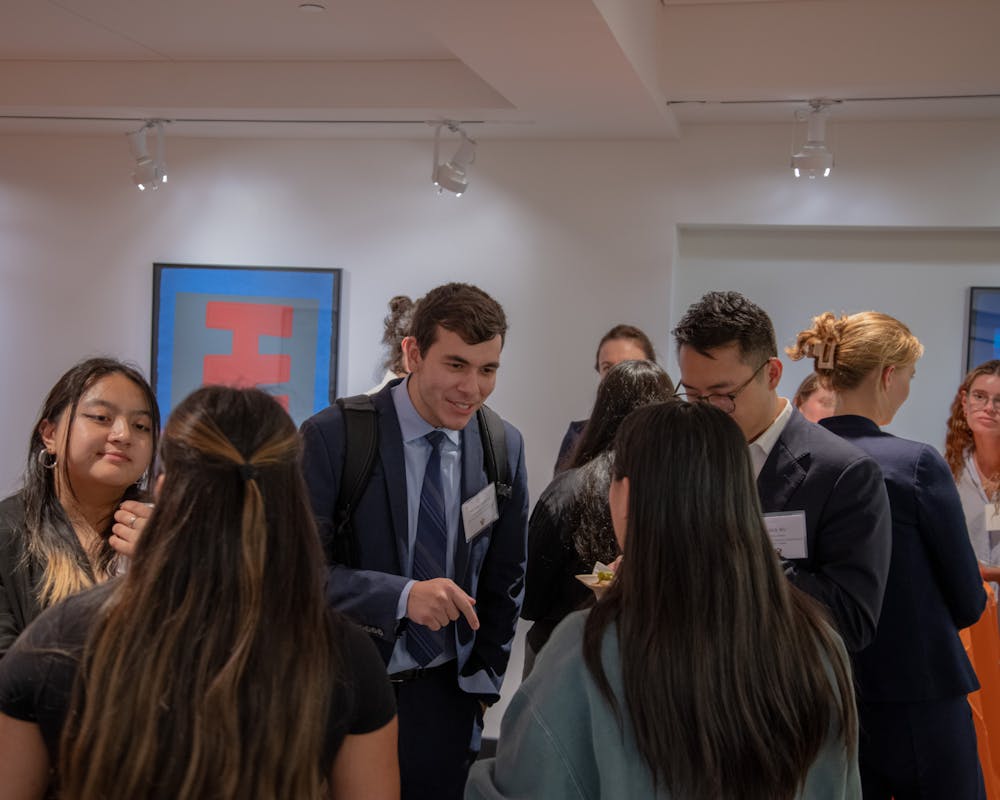The School of Public and International Affairs (SPIA) hosted its second annual “Undergraduate Policy Day in Washington” trip to its Washington headquarters on Sept. 27 — the latest in an informal push against the Princeton-to-private-sector pipeline. Since the start of the semester, SPIA has held a series of events and programs promoting careers in public service.
Princeton, which boasts the informal motto of “In the Nation’s Service and the Service of Humanity,” has long emphasized public service in its mission. For example, SPIA was first established in 1930, and it has produced notable alumni in government and public service careers, such as Ted Cruz ’92 and Ralph Nader ’55. However, some in recent years have argued that the University has strayed from its aims. According to The Daily Princetonian 2024 Senior Survey, just a third of graduates agreed with the question: “Would you characterize your postgraduate plans as ‘in the nation’s service and the service of humanity?’”
“Broadly speaking, I would say there was a push for public service,” said Aishwarya Swamidurai ’26, one of the September trip attendees, in an interview with the ‘Prince.’ Student participants reported that alumni actively encouraged SPIA students to enter public service jobs and stressed the fulfilling nature of careers in the field.
“One of the speakers mentioned that the work they do in public service is much more fun than consulting,” she added.
However, Swamidurai described comments placing greater value in working for the public sector over private sector jobs as “highly individualized,” noting that they reflected personal opinions rather than a formal stance on the part of the SPIA department.
The SPIA Public Service Career Day, held on Oct. 25, also placed a strong emphasis on public service over careers in the private sector.
“You may wonder sometimes whether your work is actually having an impact on making the world better,” said New Jersey State Senator Raj Mukherji GS ’24, a keynote speaker for the Career Day event. “In public service, you won’t be on the sidelines. Your work, directly or indirectly, will be impactful on people’s daily lives.”
“There’s no greater calling than using your talents for the benefit of others,” continued Mukherji. “It will make up for better pay [available for] private sector jobs.”

Events such as the Washington trip and Public Service Career Day are not SPIA’s first effort to convince students to pursue public service. “SPIA in New Jersey” is another program designed to bolster student participation and present viable career paths in public service. The program focuses on community service, engagement, and public policy research in the state of New Jersey through partnering with faculty members, advocacy groups, and other local organizations.
“The ‘SPIA in New Jersey’ program is about a year and a half old … [and it was] launched in response to the enthusiasm expressed not only by graduate students, but also undergrads that wanted their public policy education to prepare them for public service and public engagement,” commented Professor Anastasia R. Mann, who serves as the founding director of the initiative.
Mann stressed that its purpose is “to fulfill [Princeton’s] mission of service to the nation. Jersey is … our little slice of the nation.”
“In the aftermath of Jan. 6, many of us understood how fragile democracy is and how to have a better sense of what it takes to protect it,” she added. “In SPIA, a lot of people are excited about that work, and those are the people I work with, the students who take my classes.”

Mann added that consulting was still a viable career path that she does not discourage students from entering, saying, “Some of my best students have gone into consulting, but that doesn’t mean I love them any less for it.”
Professor Udi Ofer, founding director of the SPIA’s Policy Advocacy Clinic, expressed excitement over the department’s increased funding towards more programs oriented towards public service.
“I think it’s all about giving students choices. Our job is to make students informed … It’s my job to show students what a life could look like if they chose a similar career path as a lawyer or as a policy strategist,” he said.
However, the SPIA department emphasized that the purpose of programs like “SPIA in D.C.” and “SPIA in N.J.” is not to devalue consulting, but instead present more public service opportunities to SPIA students to provide a broader choice of careers.
“There is no attempt to guide students away from [consulting] jobs,” said Senior Associate Dean Paul Lipton. “Our objective as an undergraduate program is to give students a much broader sense of what is possible and ways to get there.”
“Anyone who believes that going into the private sector is a harm is misunderstanding and misrepresenting what those jobs do for anybody, whether students or the constituents they serve,” continued Lipton. “It is certainly not our perspective that these jobs are harmful or undesirable.”
According to Lipton, SPIA hopes to encourage students who are passionate about public policy and service, but either lack information or are considering more profit-oriented careers.
Lipton encouraged students in doubt to “come right to us … we have a wonderful and long list of alums who are more than willing and happy to discuss career opportunities in a variety of fields.”
“A lot of students come to SPIA because they want to save the world, and that is a great instinct to have, and we want to nurture that,” said Ofer.
“Different people have different life circumstances and they have to make tough decisions,” Ofer added. “It’s our job at SPIA to make sure they have all the information they need … and support them in whatever option they choose.”
Eojin Park is a News contributor for the ‘Prince.’
Please send any corrections to corrections[at]dailyprincetonian.com.








